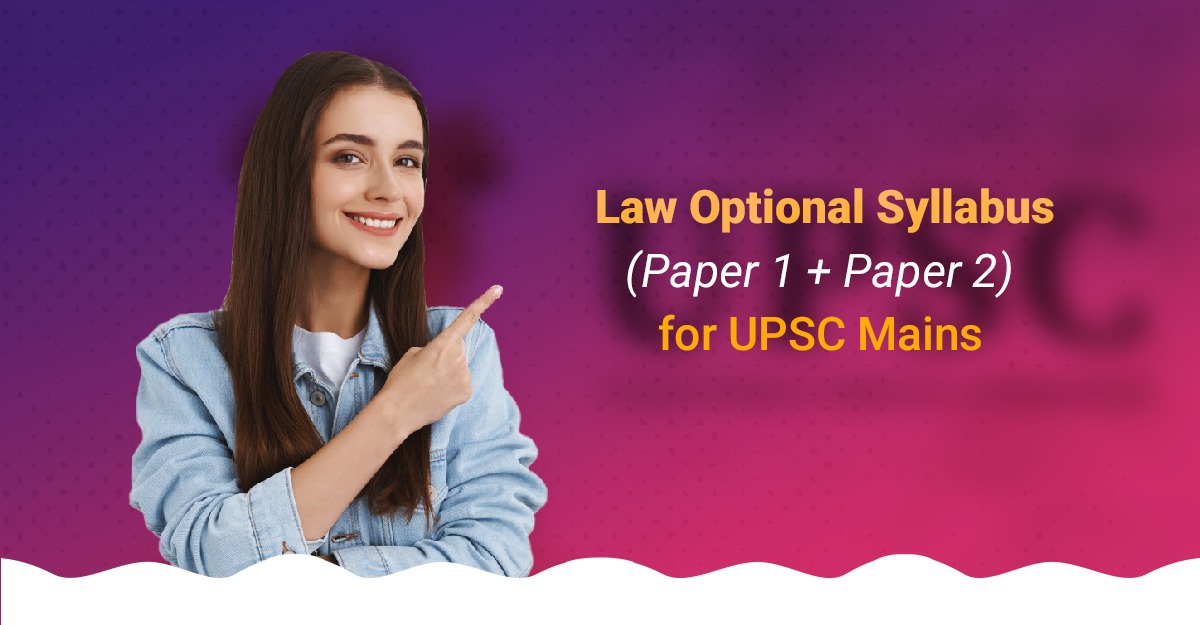
Choosing the right optional subject for UPSC Mains is very important. Law is considered one of the most popular subjects among the students. This is especially because many individuals have a special interest in laws and legal cases. Of course, it is also important for students to understand the paper pattern and the syllabus of this optional subject.
The UPSC law optional subject carries a total weightage of 500 marks which is equally divided into two papers (Paper 1 and Paper 2). The syllabus for the law optional subject of the UPSC entrance examination includes a wide variety of topics. Let us walk you through the UPSC law optional subject syllabus now. Read on!
Law Optional Paper 1 Syllabus
The law optional paper 1 syllabus is as follows:
ALSO READ – LIST OF OPTIONAL SUBJECTS
A. Constitutional and Administrative Law
- Constitution and Constitutionalism: The distinctive features of the Constitution.
- Fundamental Rights—Public interest litigation; Legal Aid; Legal services authority.
- Relationship between Fundamental Rights, Directive Principles, and Fundamental duties.
- Constitutional Position of the President and Relation with the Council of Ministers.
- Governor and his powers.
- Supreme Court and the High Courts:
- (a) Appointments and transfers.
- (b) Powers, functions, and jurisdiction.
- Centre, States, and local bodies:
- (a) Distribution of legislative powers between the Union and the States.
- (b) Local Bodies.
- (c) Administrative relationship among Union, State, and Local Bodies.
- (d) Eminent domain-State property-common property-community property.
- Legislative powers, privileges, and immunities.
- Services under the Union and the States:
- (a) Recruitment and conditions of services; Constitutional safeguards; Administrative tribunals.
- (b) Union Public Service Commission and state public Service Commissions—Power and functions.
- (c) Election Commission—Power and functions.
- Emergency provisions.
- Amendment of the Constitution.
- Principle of Natural Justice—Emerging trends and judicial approach.
- Delegated legislation and its constitutionality.
- Separation of powers and constitutional governance.
- Judicial review of administrative action.
- Ombudsman: Lokayukta, Lokpal etc.
ALSO READ – First IAS Institute
B. International Law
- Nature and Definition of International Law.
- Relationship between International Law and Municipal Law.
- State Recognition and State Succession.
- Law of the sea: Inland Waters, Territorial Sea, Contiguous Zone, Continental Shelf, Exclusive Economic Zone, and High Seas.
- Individuals: Nationality, statelessness, Human Rights, and procedures available for their enforcement.
- Territorial jurisdiction of States, Extradition, and Asylum.
- Treaties: Formation, application, termination, and reservation.
- United Nations: Its principal organs, powers and functions, and reform.
- Peaceful settlement of disputes—different modes.
- Lawful recourse to force: aggression, self-defense, intervention.
- Fundamental principles of international humanitarian law—International conventions and contemporary developments.
- Legality of the use of nuclear weapons; ban on testing of nuclear weapons; Nuclear nonproliferation treaty, CTST.
- International Terrorism, State-sponsored terrorism, Hijacking, International Criminal Court.
- New International Economic Order and Monetary Law: WTO, TRIPS, GATT, IMF, World Bank.
- Protection and Improvement of the Human Environment: International Efforts.
ALSO READ – 10 Best IAS Coaching in India
Law Optional Paper 2 Syllabus
Paper 2 of the UPSC law optional syllabus includes the following four modules:
A. Law of Crimes
- General principles of Criminal liability: mens rea and actus reus, mens rea in statutory offences.
- Kinds of punishment and emerging trends as to abolition of capital punishment.
- Preparations and criminal attempts.
- General exceptions.
- Joint and constructive liability.
- Abetment.
- Criminal conspiracy.
- Offences against the State.
- Offences against public tranquillity.
- Offences against the human body.
- Offences against property.
- Offences against women.
- Defamation.
- Prevention of Corruption Act, 1988.
- Protection of Civil Rights Act, 1955 and subsequent legislative developments.
- Plea bargaining.
ALSO READ – How to Crack UPSC Exam Without Coaching
B. Law of Torts
- Nature and definition.
- Liability based upon fault and strict liability; Absolute liability.
- Vicarious liability, including State Liability.
- General defences.
- Joint tort lessors.
- Remedies.
- Negligence.
- Defamation.
- Nuisance.
- Conspiracy.
- False imprisonment.
- Malicious prosecution.
- Consumer Protection Act, 1986.
Also Read: How to Prepare Law Optional for UPSC Civil Services Exam
C. Law of Contracts and Mercantile Law
- Nature and formation of contract/E-contract.
- Factors vitiating free consent.
- Void, voidable, illegal, and unenforceable agreements.
- Performance and discharge of contracts.
- Quasi-contracts.
- Consequences of breach of contract.
- Contract of indemnity, guarantee, and insurance.
- Contract of agency.
- Sale of goods and hire purchase.
- Formation and dissolution of the partnership.
- Negotiable Instruments Act, 1881.
- Arbitration and Conciliation Act, 1996.
- Standard form contracts.
ALSO READ – How to Prepare for UPSC CSE / IAS Interview
D. Contemporary Legal Developments
- Public Interest Litigation.
- Intellectual property rights—Concept, types/prospects.
- Information Technology Law including Cyber Laws—Concept, purpose/prospects.
- Competition Law—Concept, purpose/prospects.
- Alternate Dispute Resolution—Concept, types/prospects.
- Major statutes concerning environmental law.
- Right to Information Act.
- Trial by media.
Conclusion on Law Optional Syllabus for UPSC Mains
By comprehensively learning the topics listed above and solving sample papers based on the law optional papers syllabus, students will be able to fulfil their dream of becoming IAS officers. So, get the best guidance, use the most excellent resources, and prepare thoroughly!
READ More- 5 Best UPSC | IAS Coaching in Gwalior, How to Prepare Geography Optional for UPSC Civil Services Exam, 5 Best IAS Coaching in West Delhi, IAS vs IPS – Training, Salary, Promotion, and Power
